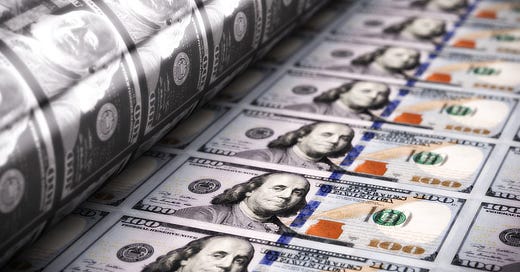Big Government Created This Economic Mess — Why Would We Think It Could Fix It?
Article by Dr. Barbara Kolm from Daily Signal cross-posted with permission.
(Daily Signal)—It has been no secret that America, Germany, Austria, and Europe in general are currently confronted with major economic problems. All are experiencing inflation and minimal economic growth. Purchasing power is decreasing, and the balances on accounts and savings books of average citizens are dwindling.
The problems started long ago and are political in nature. And the latest news also shows that political decisions attempting to quickly improve such situations can create even bigger problems in the medium or long term.
Let’s look at two news items from Germany that hold lessons for America. The first is that Germany, known as a high-savings country, is now entering a wave of “de-saving.” Between 10 and 15% of bank customers have overdrawn their accounts, 40% of Germans say they have had to draw on assets in the past year, and a third say they are no longer able to save for retirement as they used to. The savings rate has fallen from 11.3 to 10.6%.
Of course, this hits harder those whose real wages have fallen since 2019 and the middle class, which has had to spend more to maintain its existing living standard in the face of inflation. This is not yet an oppressive problem but should cause concern with regard to German citizens’ future financial independence.
The second news item concerns the German government’s response to what the loss of purchasing power has meant for the weakest in society. The “citizens’ basic income” (a basic, guaranteed income for the unemployed) is set to rise by 12% to 563 euros per month, irrespective of rent and heating cost subsidies or other transfers citizens already receive from the government.
This support, while politically helpful, creates a dangerous imbalance that could have a fatal effect on the economy. If the amount of the citizens’ basic income de facto equals or even exceeds a possible earned income, this could not only lead to false incentives to not seek work, it certainly would lead to social tensions. After all, as calculations show, an unemployed citizens’ basic income recipient will henceforth have almost the same income as a low-income earner with a job.
Former economist and West German Chancellor Ludwig Erhard’s social market economy policy enabled Germans to create property and private wealth after World War II. At the beginning of the 2000s, with the introduction of the low-interest rate policy, a downward spiral began, reinforced by negative interest rate policies and the so-called unconventional monetary policy of the European and other central banks. In 2008, the worldwide financial market crisis brought enormous national debts to light.
Small- and medium-sized enterprises, which shoulder the burden of taxes and duties with their employees, are further restricted by high taxes and regulations.
COVID-19 policies, with their disastrous lockdowns and home office regulations, put additional burdens on labor and business location.
They also brought another imbalance to light: Large corporations like Amazon had an enormous advantage in distorted competition and, therefore, made huge profits at the expense of the stagnating European economy. This was because money for private consumption was distributed by government generously and with little targeting.
And now, another burden is to be borne by the German taxpayer: skyrocketing energy prices, which are due to the centrally managed “Energiewende” (green energy transition) and the irrational phase-out of nuclear power.
The political response, however, amounts to the same “solution” as at the turn of the millennium: printing money.
Once again, policymakers are relying on an illusion of economic growth. In reality, however, this path must lead to economic upheaval or collapse and sharply rising prices. This is always the case when the central bank becomes too active. Anyone who artificially triggers a boom by printing money will also cause a crash.
Politicians in Europe and America want to improve people’s well-being. But that requires foresight and the courage to completely rethink and break new ground. More of the above measures are not the solution.




Breman egg plant fire scene cleared (KY)
100,000 chickens
HENDERSON, Ky (WEHT) – Firefighters have cleared the scene of a large fire at an egg plant in Bremen.
Officials say this happened at Cal-Maine Foods in the early morning hours of October 1. Dispatch states as of 2:10 p.m., the scene has been cleared.
Matthew Lile, Deputy Fire Chief of the Bremen Fire Department, stated a chicken house was a loss. Lile stated the structure was two stories and around 100,000 chickens were lost. According to Lile, their first call came in at 1:05 a.m. with the last unit departing at 1:30 p.m. Lile also stated the cause of the fire is undetermined at this time.
https://www.msn.com/en-us/weather/topstories/breman-egg-plant-fire-scene-cleared/ar-AA1hwy2D
Chocolate factory ignored worker concerns before blast that killed 7,
Palmer is a low end choclate that appears every holiday.
A Pennsylvania candy maker did not evacuate workers even after some reported smelling gas before an explosion that killed seven employees in March, the Department of Labor said on Thursday.The agency's Occupational Safety and Health Administration found in its investigation that the company, R.M. Palmer, did not have workers exit its manufacturing plant even after some voiced worries about what the Occupational Safety and Health Administration later determined was a natural gas leak."Seven workers will never return home because the R.M. Palmer Co. did not evacuate the facility after bring told of a suspected gas leak,"
"Seven workers will never return home because the R.M. Palmer Co. did not evacuate the facility after bring told of a suspected gas leak," OSHA Area Director Kevin Chambers in Harrisburg, Pa., said in a statement. "The company could have prevented this horrific tragedy by following required safety procedures."
An additional 10 workers were injured in the explosion, which leveled a building in the factory complex and damaged several other buildings in West Reading, Pa., a small town 60 miles northwest of Philadelphia.
https://share.newsbreak.com/53aowezi